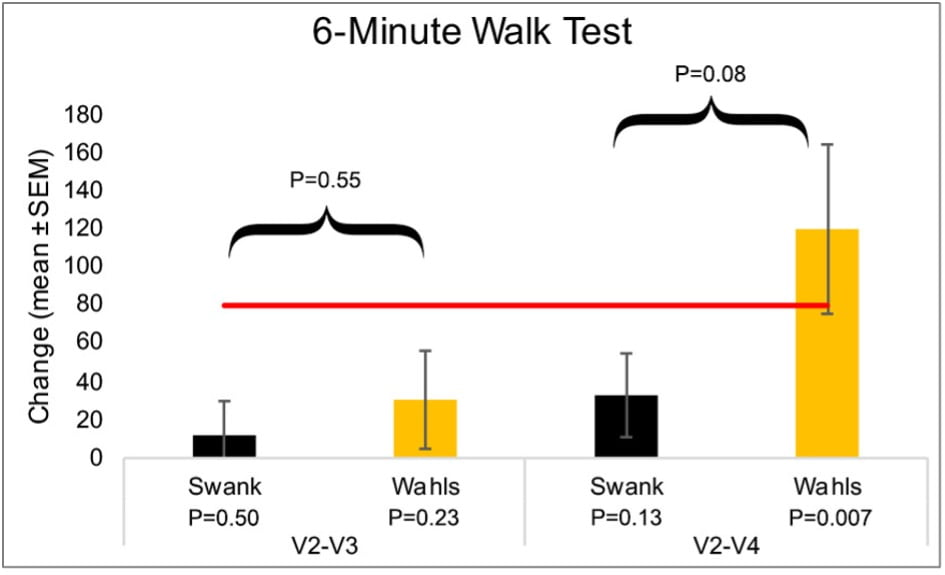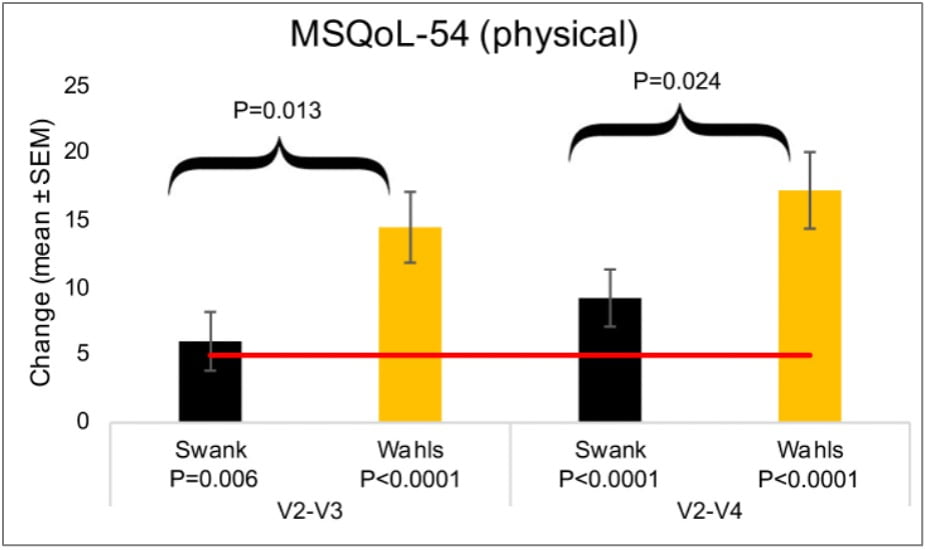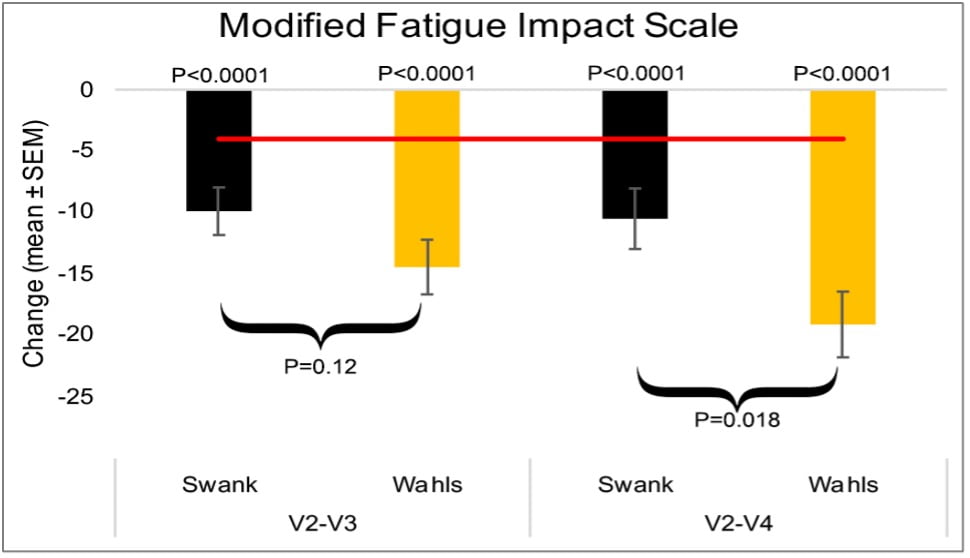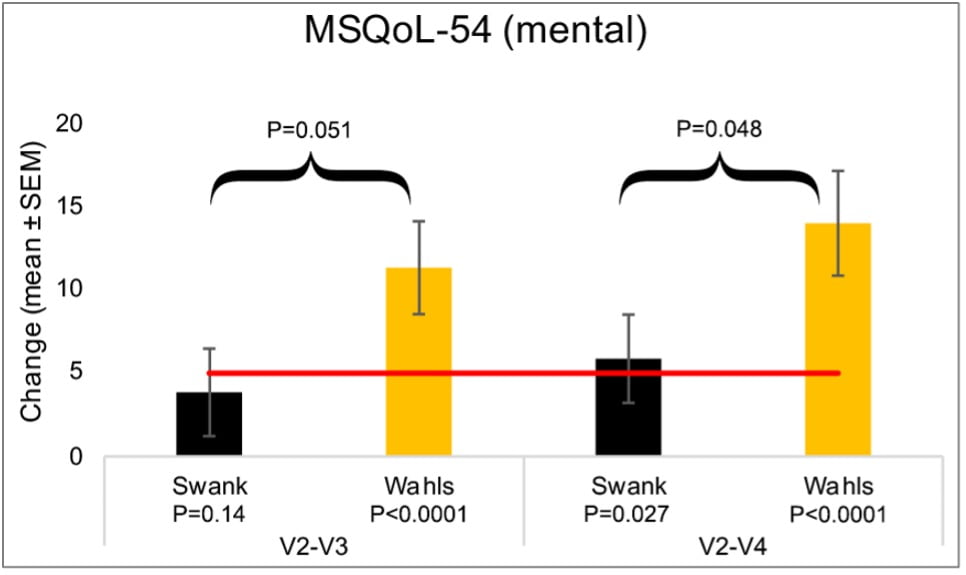Guest Post
Could a change in diet make a difference for people with multiple sclerosis (MS)?
Those are the questions our research team investigates. So far our answer is yes. Diet can reduce fatigue, improve quality of life and walking function for both relapsing-remitting MS and progressive MS.
We have conducted several pilot studies which have demonstrated that persons with progressive multiple sclerosis who adopted a modified Paleolithic diet experienced a reduction in fatigue,1,2 improvement in quality of life,1-4mood,3,4 and verbal and special reasoning.3 In addition, half of experienced improvement in walking and or hand function.5 In studies in the setting of relapsing-remitting multiple sclerosis, using a wait list control we have demonstrated that adopting a modified paleo diet is associated with improved mental health and physical health quality of life and walking function.6 In a parallel group, we compared a low saturated fat (Swank) and a modified Paleolithic elimination diet (Wahls Elimination) diet to a usual diet observation period. During the usual diet observation period fatigue, quality of life and walking endurance did not improve. However, after adopting Swank or Wahls diet fatigue was clinically an statistically significantly reduced and quality of life was also clinically and statistically significantly improved Clinically and statistically significant improvement in walking occurred in only in the Wahls group. Figures below depict the change in fatigue as measured by the Modified Fatigue Impact Scale score, change in physical health as measured by the MS Quality of Life (MSQoL) physical health scores, change in mental health as measured by the MSQoL mental health score , and change in walking endurance as measured by the 6 minute walk test. The red line indicates the clinically significant level of change.




Now will conduct a larger, longer diet study in the setting of relapsing-remitting MS. The two-year Efficacy of Diet on Quality of Life in Multiple Sclerosis (EDQ-MS) study will enroll 156 people who have MS. It will be one of the largest and longest duration MS diet studies. We are very excited that the study will include MRIs of the brain to measure the effects of diet on brain structure.
Study participants must have relapsing-remitting MS, be between the ages of 18 and 70, cannot be taking coumadin or insulin, and can walk 25 feet with no or unilateral support (cane or walking stick). Study participants will have baseline assessments which include several questionnaires, in-person assessments of walking, hand function, vision function, working memory (thinking function), and vision, as well as a non-contrast MRI of the brain. Each participant will be randomly assigned to follow a time-restricted olive oil-based ketogenic diet, the modified Paleolithic elimination diet, or their usual diet. Randomization, where people are assigned to one the study arms, will happen by chance (like flipping a coin). To assess whether changing diet can influence fatigue, quality of life or other MS-related symptoms or brain structure, the gold standard of research is a randomized, controlled study design. The control group is the group that will follow their usual diet and receive educational information about ways that they can improve their diet quality. The two intervention groups are those using either the ketogenic diet or the modified Paleolithic diet. We anticipate all three groups will likely experience improvement in their symptoms. Participants will complete brief online questionnaires every other month and will visit us at baseline, month 3 and at month 24, the end of the study, to repeat all assessments.
I have been studying the effects of diet on MS for more than a decade. I was diagnosed with MS in 2000, and by 2003 the disease had progressed so much that I was confined to a wheelchair. In 2004, I began reading basic science articles about progressive MS and other neurodegenerative diseases. I decided it was mitochondria that were not working well in MS patients, which contributes to the gradual worsening. I began experimenting on myself, first with supplements and then diet changes to provide better support for my mitochondria and my brain cells. In 2007 those interventions resolved my fatigue. My physical therapist noted that I was getting stronger and advanced my exercise program. For the first time in six years, I was able to bike again. I worked with other University of Iowa researchers to write up a paper describing my treatment and the course of my disease, which was published in 2009.
I am really passionate about teaching the public as well as health care providers that diet matters to brain health. However, to change the standard of care for MS patients, we need research which shows clearly that changing diet improves MS-related symptoms, and ideally, also findings on brain imaging. That is why we have done our previous studies, and why we are doing this study.
Our work has progressed from my initial case study describing my own use of diet, exercise, and electrical stimulation for my secondary progressive MS, to a small study using the same protocol in others with progressive MS, which was published in 2014. In 2021, we completed our largest study, the Dietary Approaches to Treating Multiple Sclerosis Related Fatigue study, which had 72 participants.
Individuals interested in being considered for enrollment in this study may complete screening questionnaires here. For questions about the study, please email MSDietStudy@healthcare.uiowa.edu. Our team also conducts other MS studies, and information about these can be found on our lab’s website.
Bio
Terry Wahls, MD
Dr. Terry Wahls is an Institute for Functional Medicine Certified Practitioner and a clinical professor of medicine at the University of Iowa, where she conducts clinical trials. In 2018, she was awarded the Institute for Functional Medicine’s Linus Pauling Award for her contributions to research, clinical care, and patient advocacy. In addition, Dr. Wahls has secondary progressive multiple sclerosis, which confined her to a tilt-recline wheelchair for four years. Dr. Wahls restored her health using a diet and lifestyle program she designed specifically for her brain and now pedals her bike to work each day.
The Wahls lab investigates observational studies of diet and interventional studies of diet and lifestyle on various health outcomes. In addition, the Wahls lab conducts interventional clinical trials of diet and lifestyle in the setting of multiple sclerosis. The diets that the Wahls lab has investigated include the modified Palaeolithic (Wahls), low saturated fat (Swank), ketogenic, and Dietary Guidelines for Americans diets.
1. Bisht B, Darling WG, Grossmann RE, et al. A multimodal intervention for patients with secondary progressive multiple sclerosis: feasibility and effect on fatigue. J Altern Complement Med. 2014;20(5):347-355.
2. Bisht B, Darling WG, Shivapour ET, et al. Multimodal intervention improves fatigue and quality of life in subjects with progressive multiple sclerosis: a pilot study. Degener Neurol Neuromuscul Dis. 2015;5:19-35.
3. Lee JE, Bisht B, Hall MJ, et al. A Multimodal, Nonpharmacologic Intervention Improves Mood and Cognitive Function in People with Multiple Sclerosis. J Am Coll Nutr. 2017;36(3):150-168.
4. Lee JE, Titcomb TJ, Bisht B, Rubenstein LM, Louison R, Wahls TL. A Modified MCT-Based Ketogenic Diet Increases Plasma beta-Hydroxybutyrate but Has Less Effect on Fatigue and Quality of Life in People with Multiple Sclerosis Compared to a Modified Paleolithic Diet: A Waitlist-Controlled, Randomized Pilot Study. J Am Coll Nutr. 2020:1-13.
5. Bisht B, Darling WG, White EC, et al. Effects of a multimodal intervention on gait and balance of subjects with progressive multiple sclerosis: a prospective longitudinal pilot study. Degener Neurol Neuromuscul Dis. 2017;7:79-93.
6. Irish AK, Erickson CM, Wahls TL, Snetselaar LG, Darling WG. Randomized control trial evaluation of a modified Paleolithic dietary intervention in the treatment of relapsing-remitting multiple sclerosis: a pilot study. Degener Neurol Neuromuscul Dis. 2017;7:1-18.



I’m glad to see that the new study will have a control group with no dietary changes, because it seems to me that any dietary intervention may have health benefits simply due to focus on diet. I’ll be curious to see results.